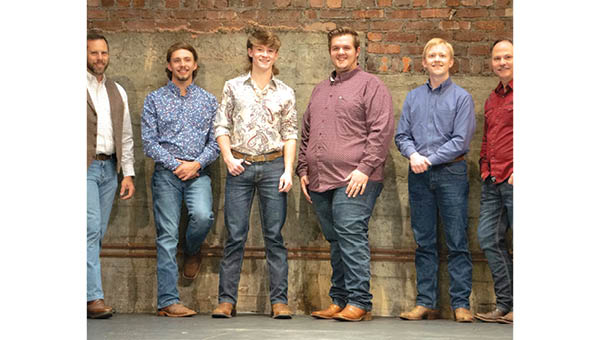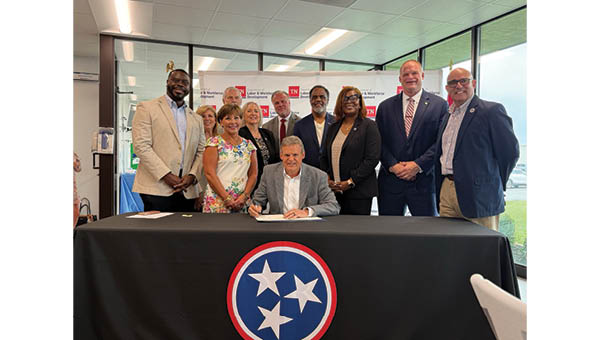Chewing gum made in Elizabethton
Published 10:44 am Friday, February 5, 2021



|
Getting your Trinity Audio player ready...
|
There is an abundance of products made in Northeast Tennessee, some that you may know about, others you may not. Some of those products include water heaters, made by AO Smith in Johnson City; toothbrushes made by Team Technologies in Morristown; hand tools and other solutions for vehicle dealerships and repair centers made by Snap-On Tools; sunscreen made by Crown Laboratories in Johnson City; tumblers made of plastic from Eastman Titan in Kingsport; bags from the Robinette Co. in Bristol and Piney Flats; milk produced in Jonesborough by Skyland Dairy and sold locally to Ingles; bricks made by General Shale; Dr. Enuf and Mountain Dew made by Tri-City Beverage in Johnson City; nuclear fuel for the U.S. Navy’s fleet of nuclear-powered aircraft carriers in submarines, which is made in Erwin; wrapping paper made by American Greetings in Greeneville; piano strings, made by Mapes in Elizabethton, and a host of other products.
There was a time — around 1900 and for some years after that — that Elizabethton was a manufacturing town and several products were made here by Carter County workers.
Among those products were Bemberg yarn, ladies’ underwear made at the East Tennessee Undergarment Factory, cardboard boxes at Tri-State Container, toothbrushes at Iodent, and long before that, there were overalls made at the Doe River Overall Factory, grape soda and other carbonated beverages manufactured by Watauga Bottling Works, cinder blocks at General Shale, shoes, twine, and lest we forget, chewing gum made at the Dixie Chewing Gum Factory. I’m sure there were other products that can be on the list Made in Elizabethton. But, these are just a few.
Elizabethton was a unique town in the early part of the 1900s. The 1890s and the first two decades of the 1900s have been unmatched in the history of the town. It was a new town in those days, bustling with activity as it expanded westward across Doe River.
Hydroelectric power came to the area via Wilbur Dam. Free delivery of mail began in the city; new businesses opened and several operated in Elizabethton. Among early industries in the city were the Watauga Flour Mills, later known as Power City Milling Co., the Doe River Overall Co., the Tennessee Cotton Mill, which later consolidated with the Tennessee Line and Twine, the Elizabethton Shoe Co., the Empire Chair Co., the Tennessee Chair Co., the Doe River Woolen Mill, and several lumber companies. There was also a hosiery mill located in Elizabethton at which several women worked.
One of the most unique businesses in the town was the Dixie Chewing Gum Co. Located on E Street in a two-story building in the vicinity of the building that formerly housed the law office of T.J. Little, the company ceased operation in the mid-1930s.
The company apparently operated in Elizabethton in the 1890s and re-located to North Carolina around the turn of the century. However, the business moved back to Elizabethton around 1926.
Records at the Carter County Courthouse indicate a charter of corporation was filed in 1926 by T.J. Ray, M.F. Hopkins, S.M. Ray, and E.C. Alexander for the Dixie Chewing Gum Co. to manufacture and sell chewing gum, candies, confections, and flavoring extracts.
In 1928 the company was taken over by the American Chewing Gum Co. At that time the company was manufacturing up to 39,000 packages per day. The Mountain Tea and Mountain Grape brands were already on the market.
Company officers at the time of the takeover were E.C. Alexander, president, and J.E. Stack and J.C. Summers of Johnson City as vice presidents.
M.E. Hopkins, among the earliest operators of the plant, also dealt in herbs and real estate. He was owner of the M.F. Hopkins Root and Herb Co., and was a former mayor of Elizabethton.
Many local herb dealers supplied Hopkins with birch oil, teaberry leaves, and peppermint to flavor his gum.
For a time the primary dealers for the gum were slot machine owners in the city. A nickel placed in the machines would net the player a pack of Red Rooster Chewing Gum or peppermint lifesavers along with chips to play the machines.
In stores, the chewing gum sold for no more than a nickel a pack. Cards advertising the gum contained little rhymes. One such rhyme was: “There’s a red rooster as you know. He had a wife as white as snow. It so happened that her name was Mint, and he put pep in her peppermint. It brightens her eyes, it gives her pluck. It whitens her teeth and makes her cluck. Red Rooster Chewing Gum.”
Several old-timers remember buying the chewing gum “trimmings” by the pound, which were placed in a barrel inside the store by the front door.
The late Lynn Goddard once shared of how, on the way to the Bonnie Kate Theater, he would stop by the chewing gum factory and purchase a bag full of the trimmings.
However, long gone are the days when Elizabethton was a manufacturing town, and long gone are the small packs of Red Rooster Chewing Gum. Also gone are the days when a pack of chewing gum could be purchased for a nickel or five pennies.








